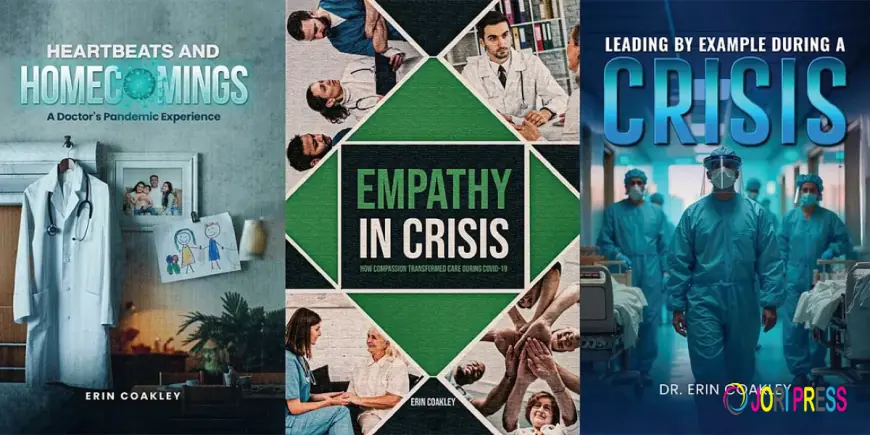The Empathy Advantage: How Compassion Turned Data into Better Decisions

Ask any exhausted team why plans fail and you’ll hear the same refrain: “We told them, but it didn’t land.” Dr. Erin Coakley argues the missing ingredient isn’t more instructions—it’s empathy. When people feel seen, they can finally hear. And when they’re heard, they act. That’s the empathy advantage: compassion that moves the needle on adherence, safety, and speed.
Dr. Coakley didn’t arrive at this thesis from the sidelines. She earned it in the most unforgiving lab for leadership—the hospital—where the stakes are human lives. As a physician and hospital medicine leader, she guided teams through the chaos of COVID-19 and the complex demands that followed. Then she did something many leaders intend to do “someday”: she wrote it down—clearly, concretely, and with heart—so others could use it.
Her trilogy captures that journey from crisis to capability:
- Empathy in Crisis: How Compassion Transformed Care During COVID-19—the skill set
- Heartbeats and Homecomings: A Doctor’s Pandemic Experience—the human story
- Leading by Example During a Crisis—the playbook
Together, they form an approachable, practical body of work for leaders who want better outcomes without burning out their people.
The Author Behind the Ideas
Erin Coakley, MD, MBA, pairs clinical credibility with operational savvy. She earned her BS in Biology from Duke University, her MD from Tulane University (AOA), and an MBA from Duke’s Fuqua School of Business. She completed residency at Georgetown/Washington Hospital Center, where she served as Chief Resident. In practice, she has served as Director of Medicine and Chair of Medicine in a Texas community hospital while teaching as a Clinical Assistant Professor at Texas A&M.
Those roles shaped her signature voice on the page: warm, plain-spoken, and relentlessly useful. Dr. Coakley writes like she leads—set the tone, explain the “why,” protect the people doing the work, and keep moving. Readers say they come for the stories and stay for the checklists; event organizers say they book her because she connects compassion to outcomes that matter.
“Behind every metric is a person. Empathy is the shortest path to behavior change.”
How Empathy Changes the Numbers
Understanding → Adherence
Teach-back (“Just to be sure I explained it well, how will you do this at home?”) catches confusion early. Plans stick when people can repeat them in their own words.
Trust → Earlier Escalation
When teams feel safe to raise a hand, small issues are surfaced sooner—and solved faster—before they become expensive problems.
Belonging → Retention
Fair assignments, transparent decisions, and micro-recognition make people want to stay. Stability preserves institutional memory and momentum.
In Empathy in Crisis, Dr. Coakley distills the micro-practices that make these shifts visible on dashboards: begin with a one-sentence agenda, ask what matters most to the person in front of you, and end with clear next steps and “when to call.” None are flashy. All are repeatable.
The Stories Behind the Stats
If you ever forget that metrics are human lives in disguise, Heartbeats and Homecomings will remind you. The book lingers on inflection points that changed trajectories: a translator invited in early; a quiet pause before a hard decision; a nurse’s name remembered at the end of a 12-hour shift. These touches didn’t slow care—they smoothed it. Families understood the “why,” and teams worked with fewer misunderstandings and more grace.
This is where Dr. Coakley’s authorial strength shines: she tells the truth of high-pressure work without melodrama, then shows you how to turn that truth into a small, durable system you can start using tomorrow.
Lead So People Can Follow
For managers asking, “Where do I begin?”, Leading by Example During a Crisis lays the scaffolding:
- Share standards in plain language. Name what “good” looks like.
- Explain the why before the how. Context reduces resistance.
- Co-own gaps without blame. Land on one next step and close the loop.
- Ritualize the small wins. A 10-minute huddle that ends on a win builds momentum.
These habits are portable, from wards to warehouses, clinics to customer success teams. The point isn’t to admire heroics; it’s to make excellence easier.
What Makes Dr. Coakley’s Writing Different
- Author + Operator: She writes from lived practice, not theory.
- Warm & Approachable: Clear sentences, zero jargon, human stakes.
- Action-Ready: Checklists, scripts, and huddle templates you can deploy Monday morning.
- Cross-Industry Fit: Healthcare rigor with universal relevance—any place where teams must perform under pressure.
Her books are already being used in leadership rounds, manager boot camps, and cross-functional off-sites. The reason is simple: when empathy becomes a method, people understand faster, work safer, and deliver better.
About the Books (Author Spotlight)
- Heartbeats and Homecomings: A Doctor’s Pandemic Experience
The meaning: front-line narratives that restore the human center of the work and show why dignity sustains performance. - Empathy in Crisis: How Compassion Transformed Care During COVID-19
The method: five daily practices that translate empathy into adherence, safety, and speed—complete with scripts you can borrow.
- Leading by Example During a Crisis
The mechanics: huddles that start on time and end on a win; fair, visible assignments; and accountability without blame.
Bring the Empathy Advantage to Your Organization
Read the trilogy and invite Dr. Coakley to help your teams make empathy a method so plans land, behaviors change, and results improve. Booking a speaker? Dr. Coakley’s keynotes are ideal for conferences, grand rounds, leadership retreats, and cross-industry off-sites.
What's Your Reaction?
 Like
0
Like
0
 Dislike
0
Dislike
0
 Love
0
Love
0
 Funny
0
Funny
0
 Angry
0
Angry
0
 Sad
0
Sad
0
 Wow
0
Wow
0
















































